Criminal Law Report: Exploring Theft, Fraud, and Legal Defenses
VerifiedAdded on 2022/12/19
|11
|2512
|54
Report
AI Summary
This criminal law report provides a comprehensive overview of key concepts, including theft, fraud, and legal defenses. Part A delves into the definitions, legislation, and case laws related to theft and fraud, examining the elements of each offense and the relevant provisions of the Theft Act 1968 and Fraud Act 2006. Part B explores the distinctions between preparation and attempt in criminal law, as well as the defense of consent in non-fatal offenses. The report analyzes the actus reus and mens rea of offenses, along with relevant case law such as Lawrence v. Metropolitan Police Commissioner, R v Ghosh, and Lambie. It also discusses the application of defenses like consent in various scenarios, including threats and the involvement of children and mentally incapable persons. The report highlights the complexities of criminal law and the need for reforms in certain areas, providing a valuable resource for students studying law.
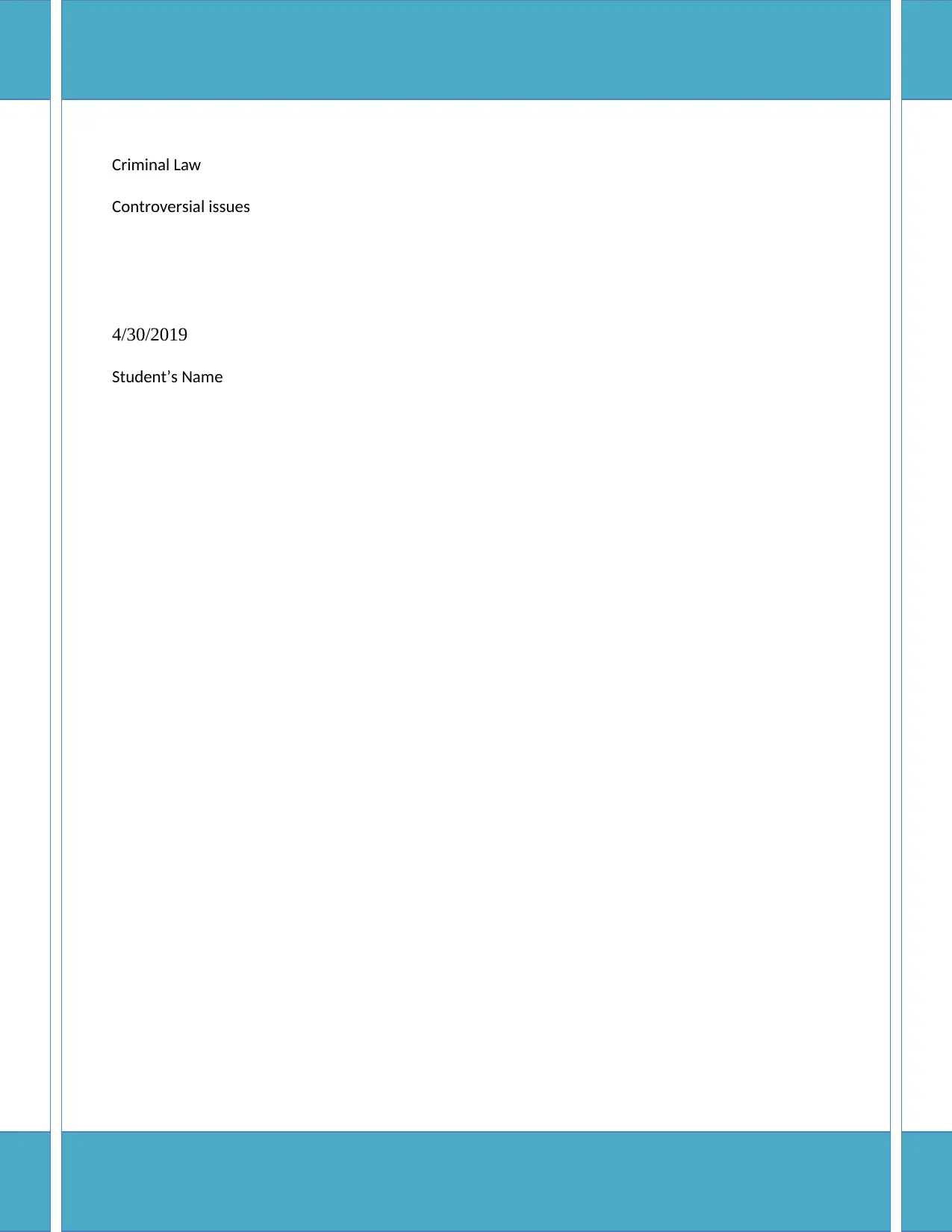
Running Head: BUSINESS AND CORPORATION LAW 0
Criminal Law
Controversial issues
4/30/2019
Student’s Name
Criminal Law
Controversial issues
4/30/2019
Student’s Name
Paraphrase This Document
Need a fresh take? Get an instant paraphrase of this document with our AI Paraphraser
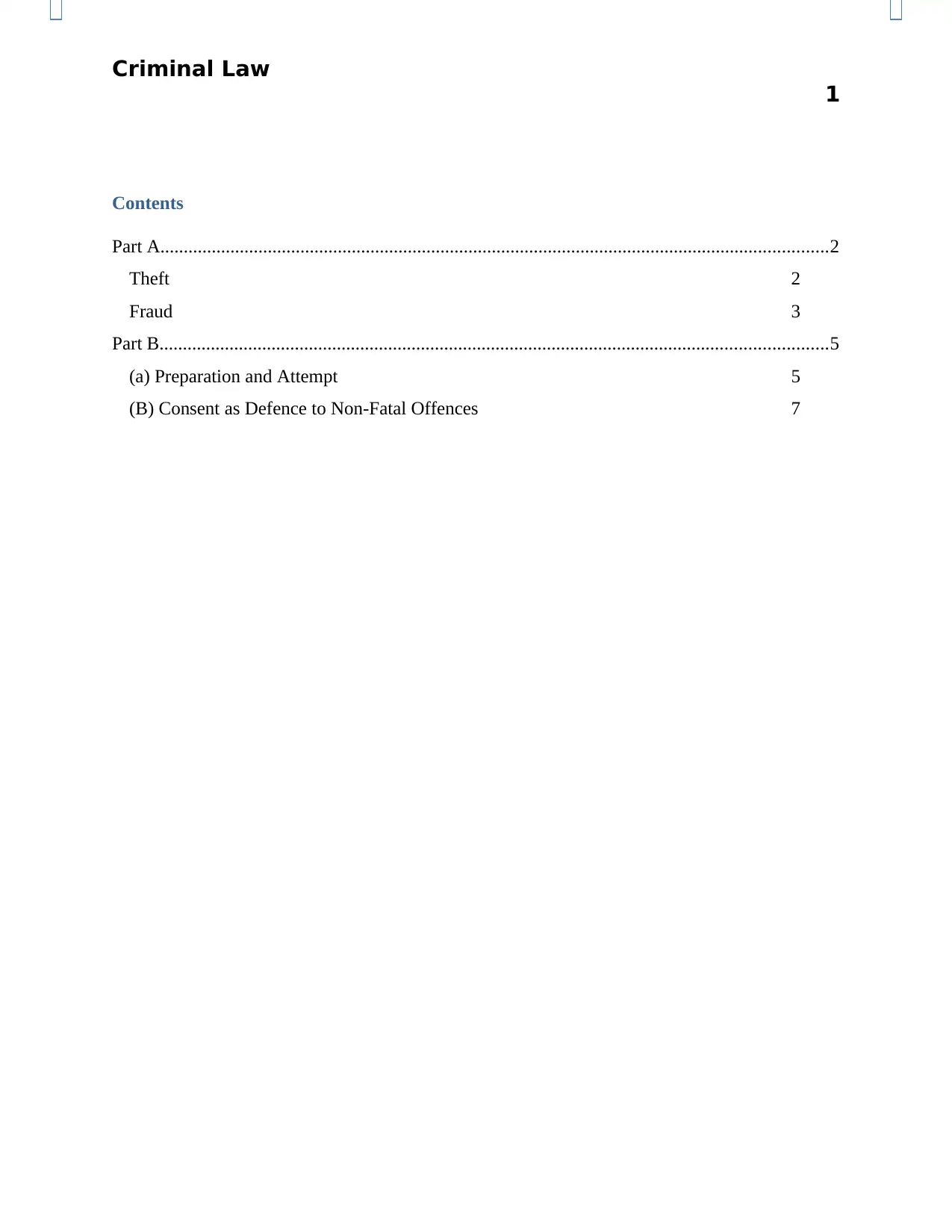
Criminal Law
1
Contents
Part A...............................................................................................................................................2
Theft 2
Fraud 3
Part B...............................................................................................................................................5
(a) Preparation and Attempt 5
(B) Consent as Defence to Non-Fatal Offences 7
1
Contents
Part A...............................................................................................................................................2
Theft 2
Fraud 3
Part B...............................................................................................................................................5
(a) Preparation and Attempt 5
(B) Consent as Defence to Non-Fatal Offences 7
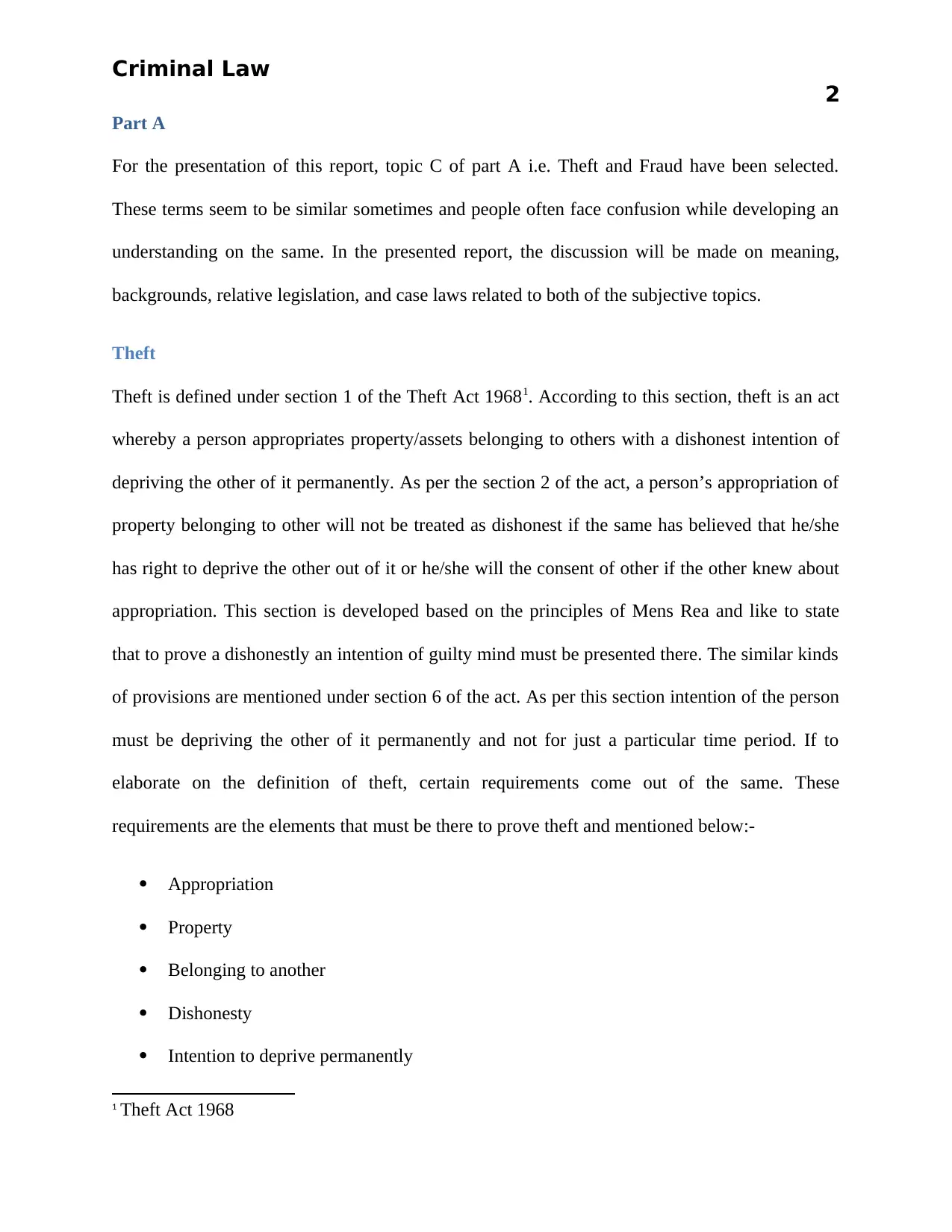
Criminal Law
2
Part A
For the presentation of this report, topic C of part A i.e. Theft and Fraud have been selected.
These terms seem to be similar sometimes and people often face confusion while developing an
understanding on the same. In the presented report, the discussion will be made on meaning,
backgrounds, relative legislation, and case laws related to both of the subjective topics.
Theft
Theft is defined under section 1 of the Theft Act 19681. According to this section, theft is an act
whereby a person appropriates property/assets belonging to others with a dishonest intention of
depriving the other of it permanently. As per the section 2 of the act, a person’s appropriation of
property belonging to other will not be treated as dishonest if the same has believed that he/she
has right to deprive the other out of it or he/she will the consent of other if the other knew about
appropriation. This section is developed based on the principles of Mens Rea and like to state
that to prove a dishonestly an intention of guilty mind must be presented there. The similar kinds
of provisions are mentioned under section 6 of the act. As per this section intention of the person
must be depriving the other of it permanently and not for just a particular time period. If to
elaborate on the definition of theft, certain requirements come out of the same. These
requirements are the elements that must be there to prove theft and mentioned below:-
Appropriation
Property
Belonging to another
Dishonesty
Intention to deprive permanently
1 Theft Act 1968
2
Part A
For the presentation of this report, topic C of part A i.e. Theft and Fraud have been selected.
These terms seem to be similar sometimes and people often face confusion while developing an
understanding on the same. In the presented report, the discussion will be made on meaning,
backgrounds, relative legislation, and case laws related to both of the subjective topics.
Theft
Theft is defined under section 1 of the Theft Act 19681. According to this section, theft is an act
whereby a person appropriates property/assets belonging to others with a dishonest intention of
depriving the other of it permanently. As per the section 2 of the act, a person’s appropriation of
property belonging to other will not be treated as dishonest if the same has believed that he/she
has right to deprive the other out of it or he/she will the consent of other if the other knew about
appropriation. This section is developed based on the principles of Mens Rea and like to state
that to prove a dishonestly an intention of guilty mind must be presented there. The similar kinds
of provisions are mentioned under section 6 of the act. As per this section intention of the person
must be depriving the other of it permanently and not for just a particular time period. If to
elaborate on the definition of theft, certain requirements come out of the same. These
requirements are the elements that must be there to prove theft and mentioned below:-
Appropriation
Property
Belonging to another
Dishonesty
Intention to deprive permanently
1 Theft Act 1968
⊘ This is a preview!⊘
Do you want full access?
Subscribe today to unlock all pages.

Trusted by 1+ million students worldwide
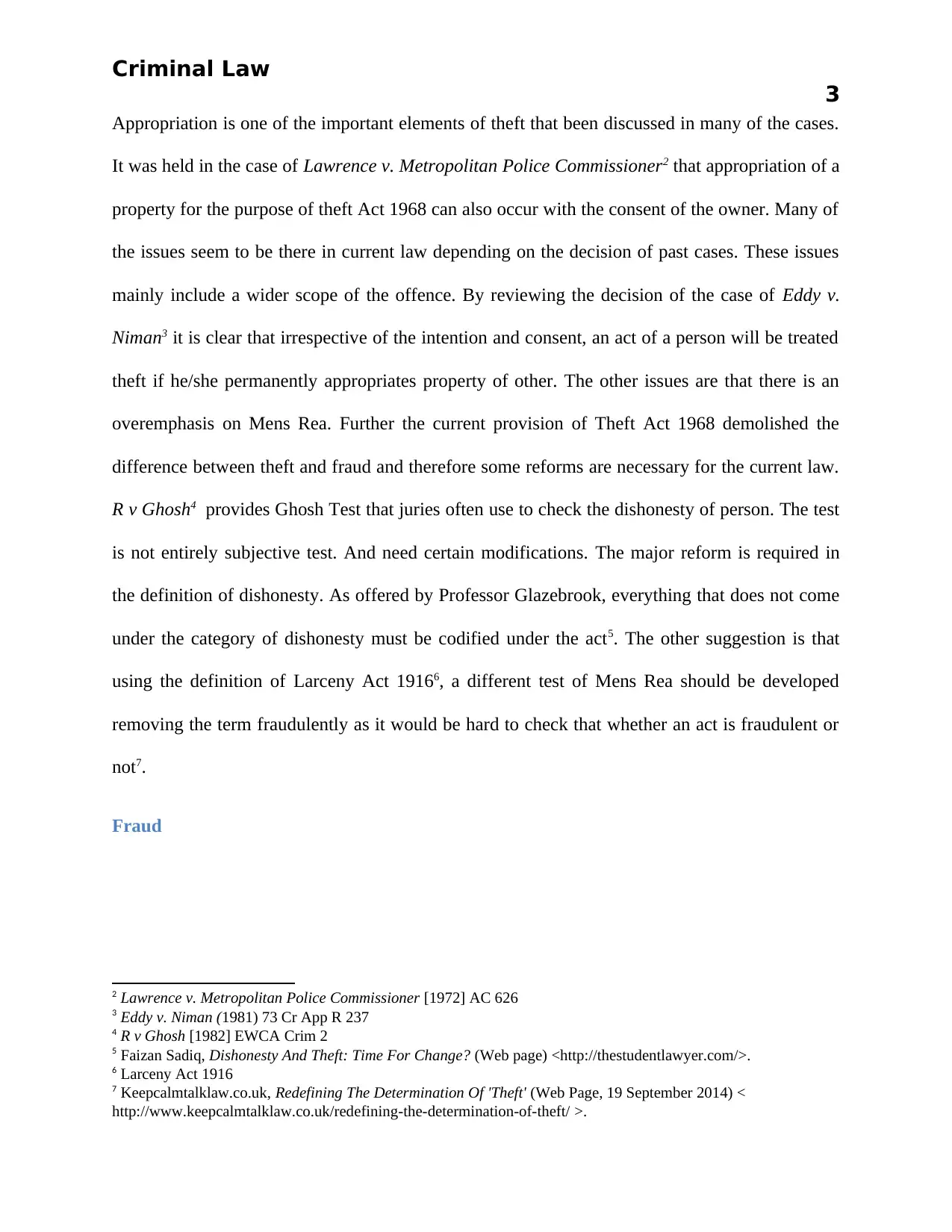
Criminal Law
3
Appropriation is one of the important elements of theft that been discussed in many of the cases.
It was held in the case of Lawrence v. Metropolitan Police Commissioner2 that appropriation of a
property for the purpose of theft Act 1968 can also occur with the consent of the owner. Many of
the issues seem to be there in current law depending on the decision of past cases. These issues
mainly include a wider scope of the offence. By reviewing the decision of the case of Eddy v.
Niman3 it is clear that irrespective of the intention and consent, an act of a person will be treated
theft if he/she permanently appropriates property of other. The other issues are that there is an
overemphasis on Mens Rea. Further the current provision of Theft Act 1968 demolished the
difference between theft and fraud and therefore some reforms are necessary for the current law.
R v Ghosh4 provides Ghosh Test that juries often use to check the dishonesty of person. The test
is not entirely subjective test. And need certain modifications. The major reform is required in
the definition of dishonesty. As offered by Professor Glazebrook, everything that does not come
under the category of dishonesty must be codified under the act5. The other suggestion is that
using the definition of Larceny Act 19166, a different test of Mens Rea should be developed
removing the term fraudulently as it would be hard to check that whether an act is fraudulent or
not7.
Fraud
2 Lawrence v. Metropolitan Police Commissioner [1972] AC 626
3 Eddy v. Niman (1981) 73 Cr App R 237
4 R v Ghosh [1982] EWCA Crim 2
5 Faizan Sadiq, Dishonesty And Theft: Time For Change? (Web page) <http://thestudentlawyer.com/>.
6 Larceny Act 1916
7 Keepcalmtalklaw.co.uk, Redefining The Determination Of 'Theft' (Web Page, 19 September 2014) <
http://www.keepcalmtalklaw.co.uk/redefining-the-determination-of-theft/ >.
3
Appropriation is one of the important elements of theft that been discussed in many of the cases.
It was held in the case of Lawrence v. Metropolitan Police Commissioner2 that appropriation of a
property for the purpose of theft Act 1968 can also occur with the consent of the owner. Many of
the issues seem to be there in current law depending on the decision of past cases. These issues
mainly include a wider scope of the offence. By reviewing the decision of the case of Eddy v.
Niman3 it is clear that irrespective of the intention and consent, an act of a person will be treated
theft if he/she permanently appropriates property of other. The other issues are that there is an
overemphasis on Mens Rea. Further the current provision of Theft Act 1968 demolished the
difference between theft and fraud and therefore some reforms are necessary for the current law.
R v Ghosh4 provides Ghosh Test that juries often use to check the dishonesty of person. The test
is not entirely subjective test. And need certain modifications. The major reform is required in
the definition of dishonesty. As offered by Professor Glazebrook, everything that does not come
under the category of dishonesty must be codified under the act5. The other suggestion is that
using the definition of Larceny Act 19166, a different test of Mens Rea should be developed
removing the term fraudulently as it would be hard to check that whether an act is fraudulent or
not7.
Fraud
2 Lawrence v. Metropolitan Police Commissioner [1972] AC 626
3 Eddy v. Niman (1981) 73 Cr App R 237
4 R v Ghosh [1982] EWCA Crim 2
5 Faizan Sadiq, Dishonesty And Theft: Time For Change? (Web page) <http://thestudentlawyer.com/>.
6 Larceny Act 1916
7 Keepcalmtalklaw.co.uk, Redefining The Determination Of 'Theft' (Web Page, 19 September 2014) <
http://www.keepcalmtalklaw.co.uk/redefining-the-determination-of-theft/ >.
Paraphrase This Document
Need a fresh take? Get an instant paraphrase of this document with our AI Paraphraser
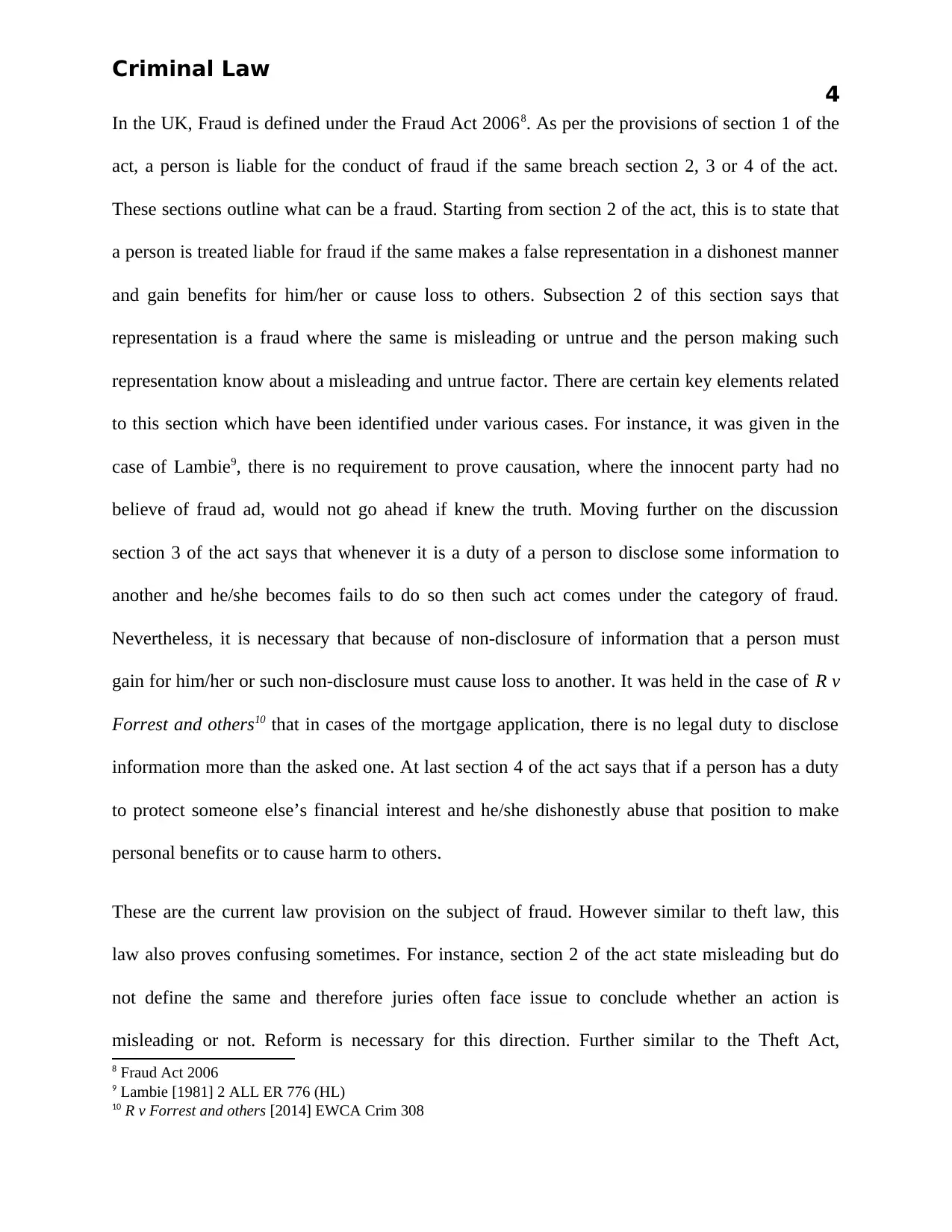
Criminal Law
4
In the UK, Fraud is defined under the Fraud Act 20068. As per the provisions of section 1 of the
act, a person is liable for the conduct of fraud if the same breach section 2, 3 or 4 of the act.
These sections outline what can be a fraud. Starting from section 2 of the act, this is to state that
a person is treated liable for fraud if the same makes a false representation in a dishonest manner
and gain benefits for him/her or cause loss to others. Subsection 2 of this section says that
representation is a fraud where the same is misleading or untrue and the person making such
representation know about a misleading and untrue factor. There are certain key elements related
to this section which have been identified under various cases. For instance, it was given in the
case of Lambie9, there is no requirement to prove causation, where the innocent party had no
believe of fraud ad, would not go ahead if knew the truth. Moving further on the discussion
section 3 of the act says that whenever it is a duty of a person to disclose some information to
another and he/she becomes fails to do so then such act comes under the category of fraud.
Nevertheless, it is necessary that because of non-disclosure of information that a person must
gain for him/her or such non-disclosure must cause loss to another. It was held in the case of R v
Forrest and others10 that in cases of the mortgage application, there is no legal duty to disclose
information more than the asked one. At last section 4 of the act says that if a person has a duty
to protect someone else’s financial interest and he/she dishonestly abuse that position to make
personal benefits or to cause harm to others.
These are the current law provision on the subject of fraud. However similar to theft law, this
law also proves confusing sometimes. For instance, section 2 of the act state misleading but do
not define the same and therefore juries often face issue to conclude whether an action is
misleading or not. Reform is necessary for this direction. Further similar to the Theft Act,
8 Fraud Act 2006
9 Lambie [1981] 2 ALL ER 776 (HL)
10 R v Forrest and others [2014] EWCA Crim 308
4
In the UK, Fraud is defined under the Fraud Act 20068. As per the provisions of section 1 of the
act, a person is liable for the conduct of fraud if the same breach section 2, 3 or 4 of the act.
These sections outline what can be a fraud. Starting from section 2 of the act, this is to state that
a person is treated liable for fraud if the same makes a false representation in a dishonest manner
and gain benefits for him/her or cause loss to others. Subsection 2 of this section says that
representation is a fraud where the same is misleading or untrue and the person making such
representation know about a misleading and untrue factor. There are certain key elements related
to this section which have been identified under various cases. For instance, it was given in the
case of Lambie9, there is no requirement to prove causation, where the innocent party had no
believe of fraud ad, would not go ahead if knew the truth. Moving further on the discussion
section 3 of the act says that whenever it is a duty of a person to disclose some information to
another and he/she becomes fails to do so then such act comes under the category of fraud.
Nevertheless, it is necessary that because of non-disclosure of information that a person must
gain for him/her or such non-disclosure must cause loss to another. It was held in the case of R v
Forrest and others10 that in cases of the mortgage application, there is no legal duty to disclose
information more than the asked one. At last section 4 of the act says that if a person has a duty
to protect someone else’s financial interest and he/she dishonestly abuse that position to make
personal benefits or to cause harm to others.
These are the current law provision on the subject of fraud. However similar to theft law, this
law also proves confusing sometimes. For instance, section 2 of the act state misleading but do
not define the same and therefore juries often face issue to conclude whether an action is
misleading or not. Reform is necessary for this direction. Further similar to the Theft Act,
8 Fraud Act 2006
9 Lambie [1981] 2 ALL ER 776 (HL)
10 R v Forrest and others [2014] EWCA Crim 308
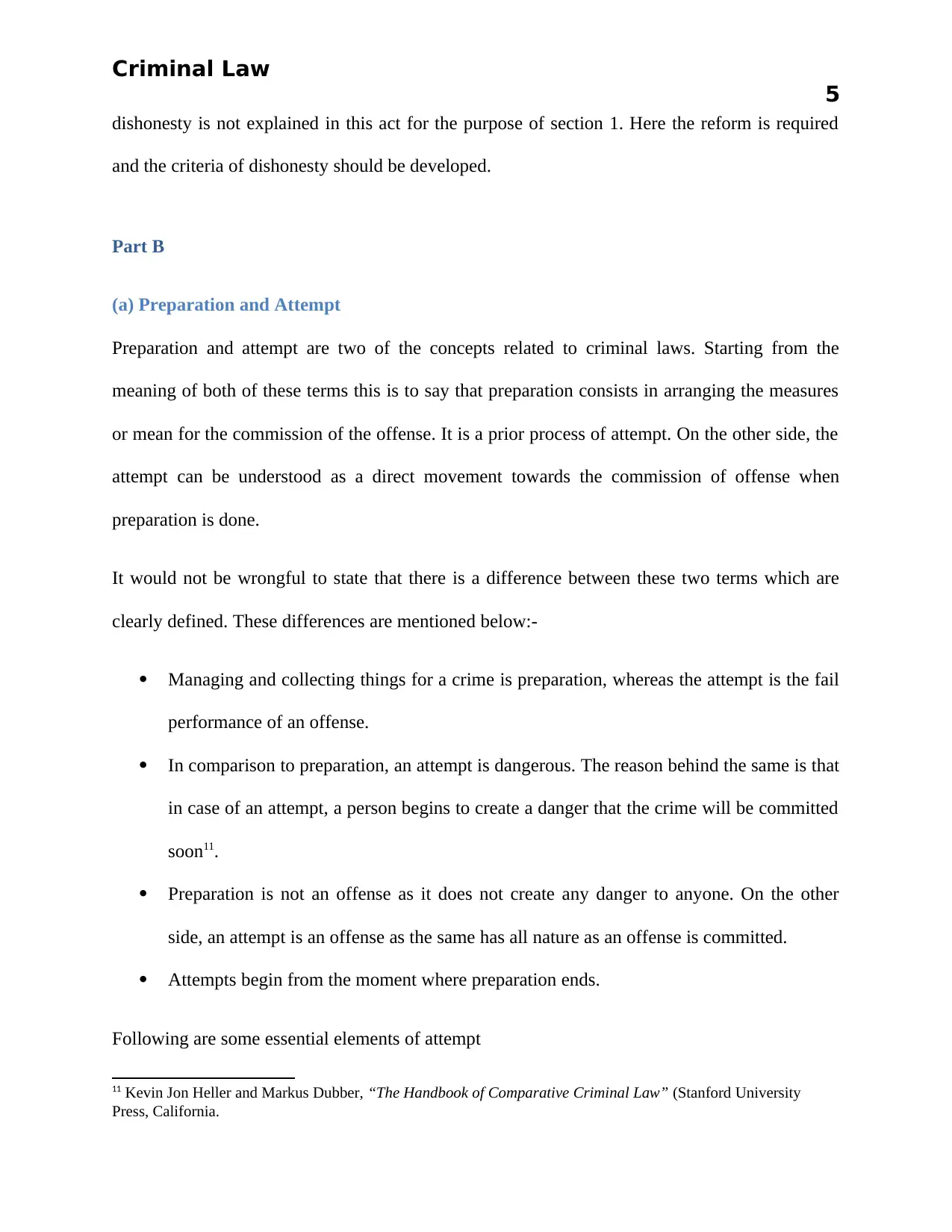
Criminal Law
5
dishonesty is not explained in this act for the purpose of section 1. Here the reform is required
and the criteria of dishonesty should be developed.
Part B
(a) Preparation and Attempt
Preparation and attempt are two of the concepts related to criminal laws. Starting from the
meaning of both of these terms this is to say that preparation consists in arranging the measures
or mean for the commission of the offense. It is a prior process of attempt. On the other side, the
attempt can be understood as a direct movement towards the commission of offense when
preparation is done.
It would not be wrongful to state that there is a difference between these two terms which are
clearly defined. These differences are mentioned below:-
Managing and collecting things for a crime is preparation, whereas the attempt is the fail
performance of an offense.
In comparison to preparation, an attempt is dangerous. The reason behind the same is that
in case of an attempt, a person begins to create a danger that the crime will be committed
soon11.
Preparation is not an offense as it does not create any danger to anyone. On the other
side, an attempt is an offense as the same has all nature as an offense is committed.
Attempts begin from the moment where preparation ends.
Following are some essential elements of attempt
11 Kevin Jon Heller and Markus Dubber, “The Handbook of Comparative Criminal Law” (Stanford University
Press, California.
5
dishonesty is not explained in this act for the purpose of section 1. Here the reform is required
and the criteria of dishonesty should be developed.
Part B
(a) Preparation and Attempt
Preparation and attempt are two of the concepts related to criminal laws. Starting from the
meaning of both of these terms this is to say that preparation consists in arranging the measures
or mean for the commission of the offense. It is a prior process of attempt. On the other side, the
attempt can be understood as a direct movement towards the commission of offense when
preparation is done.
It would not be wrongful to state that there is a difference between these two terms which are
clearly defined. These differences are mentioned below:-
Managing and collecting things for a crime is preparation, whereas the attempt is the fail
performance of an offense.
In comparison to preparation, an attempt is dangerous. The reason behind the same is that
in case of an attempt, a person begins to create a danger that the crime will be committed
soon11.
Preparation is not an offense as it does not create any danger to anyone. On the other
side, an attempt is an offense as the same has all nature as an offense is committed.
Attempts begin from the moment where preparation ends.
Following are some essential elements of attempt
11 Kevin Jon Heller and Markus Dubber, “The Handbook of Comparative Criminal Law” (Stanford University
Press, California.
⊘ This is a preview!⊘
Do you want full access?
Subscribe today to unlock all pages.

Trusted by 1+ million students worldwide
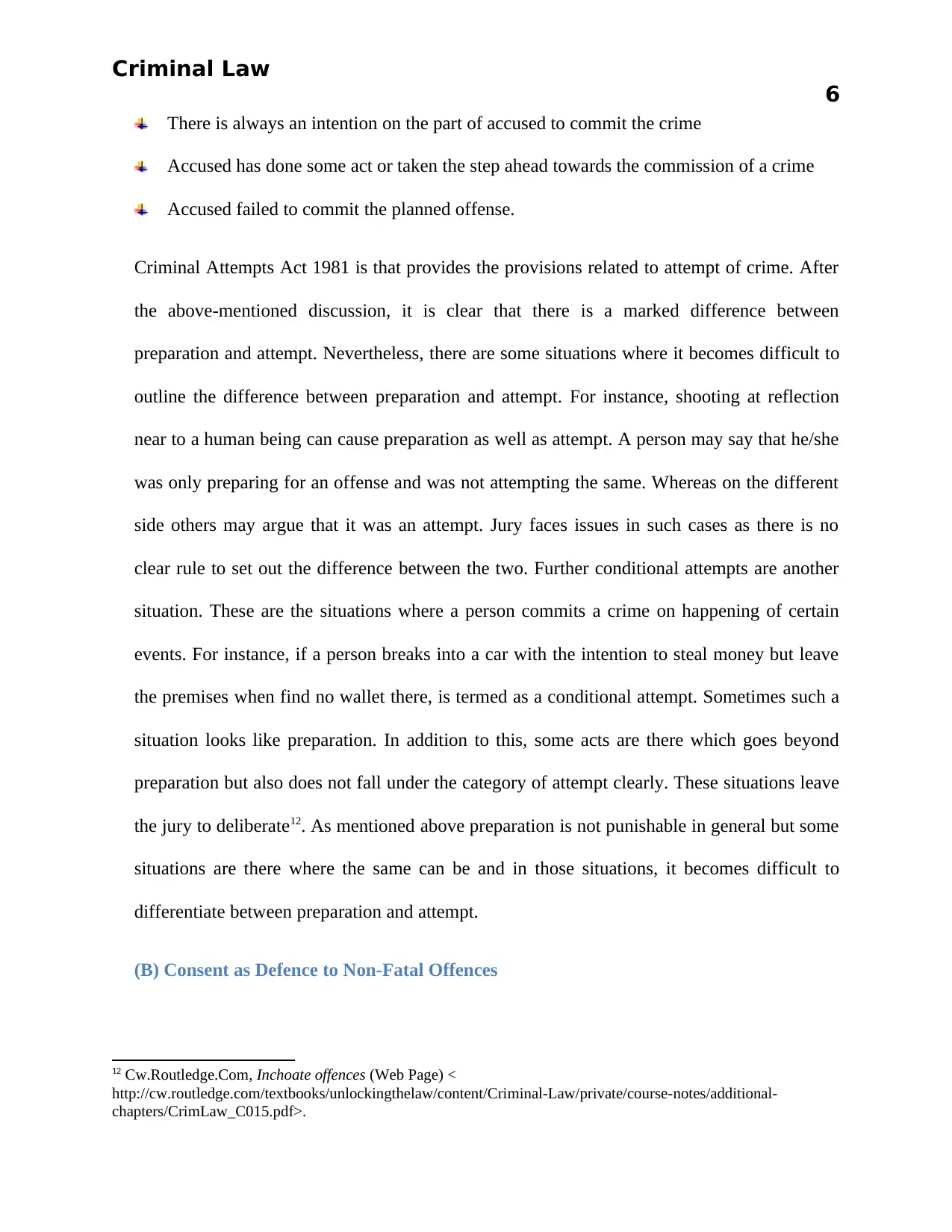
Criminal Law
6
There is always an intention on the part of accused to commit the crime
Accused has done some act or taken the step ahead towards the commission of a crime
Accused failed to commit the planned offense.
Criminal Attempts Act 1981 is that provides the provisions related to attempt of crime. After
the above-mentioned discussion, it is clear that there is a marked difference between
preparation and attempt. Nevertheless, there are some situations where it becomes difficult to
outline the difference between preparation and attempt. For instance, shooting at reflection
near to a human being can cause preparation as well as attempt. A person may say that he/she
was only preparing for an offense and was not attempting the same. Whereas on the different
side others may argue that it was an attempt. Jury faces issues in such cases as there is no
clear rule to set out the difference between the two. Further conditional attempts are another
situation. These are the situations where a person commits a crime on happening of certain
events. For instance, if a person breaks into a car with the intention to steal money but leave
the premises when find no wallet there, is termed as a conditional attempt. Sometimes such a
situation looks like preparation. In addition to this, some acts are there which goes beyond
preparation but also does not fall under the category of attempt clearly. These situations leave
the jury to deliberate12. As mentioned above preparation is not punishable in general but some
situations are there where the same can be and in those situations, it becomes difficult to
differentiate between preparation and attempt.
(B) Consent as Defence to Non-Fatal Offences
12 Cw.Routledge.Com, Inchoate offences (Web Page) <
http://cw.routledge.com/textbooks/unlockingthelaw/content/Criminal-Law/private/course-notes/additional-
chapters/CrimLaw_C015.pdf>.
6
There is always an intention on the part of accused to commit the crime
Accused has done some act or taken the step ahead towards the commission of a crime
Accused failed to commit the planned offense.
Criminal Attempts Act 1981 is that provides the provisions related to attempt of crime. After
the above-mentioned discussion, it is clear that there is a marked difference between
preparation and attempt. Nevertheless, there are some situations where it becomes difficult to
outline the difference between preparation and attempt. For instance, shooting at reflection
near to a human being can cause preparation as well as attempt. A person may say that he/she
was only preparing for an offense and was not attempting the same. Whereas on the different
side others may argue that it was an attempt. Jury faces issues in such cases as there is no
clear rule to set out the difference between the two. Further conditional attempts are another
situation. These are the situations where a person commits a crime on happening of certain
events. For instance, if a person breaks into a car with the intention to steal money but leave
the premises when find no wallet there, is termed as a conditional attempt. Sometimes such a
situation looks like preparation. In addition to this, some acts are there which goes beyond
preparation but also does not fall under the category of attempt clearly. These situations leave
the jury to deliberate12. As mentioned above preparation is not punishable in general but some
situations are there where the same can be and in those situations, it becomes difficult to
differentiate between preparation and attempt.
(B) Consent as Defence to Non-Fatal Offences
12 Cw.Routledge.Com, Inchoate offences (Web Page) <
http://cw.routledge.com/textbooks/unlockingthelaw/content/Criminal-Law/private/course-notes/additional-
chapters/CrimLaw_C015.pdf>.
Paraphrase This Document
Need a fresh take? Get an instant paraphrase of this document with our AI Paraphraser
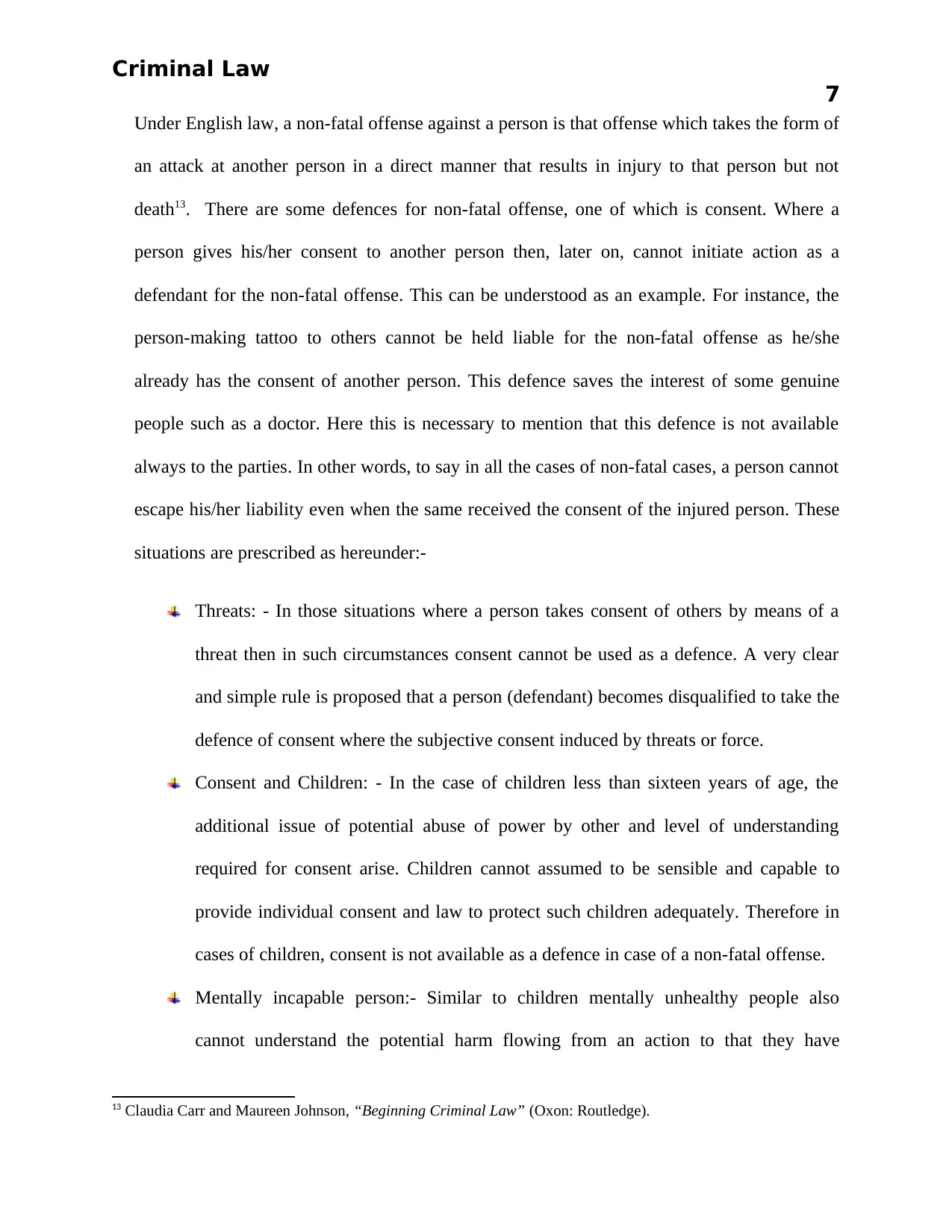
Criminal Law
7
Under English law, a non-fatal offense against a person is that offense which takes the form of
an attack at another person in a direct manner that results in injury to that person but not
death13. There are some defences for non-fatal offense, one of which is consent. Where a
person gives his/her consent to another person then, later on, cannot initiate action as a
defendant for the non-fatal offense. This can be understood as an example. For instance, the
person-making tattoo to others cannot be held liable for the non-fatal offense as he/she
already has the consent of another person. This defence saves the interest of some genuine
people such as a doctor. Here this is necessary to mention that this defence is not available
always to the parties. In other words, to say in all the cases of non-fatal cases, a person cannot
escape his/her liability even when the same received the consent of the injured person. These
situations are prescribed as hereunder:-
Threats: - In those situations where a person takes consent of others by means of a
threat then in such circumstances consent cannot be used as a defence. A very clear
and simple rule is proposed that a person (defendant) becomes disqualified to take the
defence of consent where the subjective consent induced by threats or force.
Consent and Children: - In the case of children less than sixteen years of age, the
additional issue of potential abuse of power by other and level of understanding
required for consent arise. Children cannot assumed to be sensible and capable to
provide individual consent and law to protect such children adequately. Therefore in
cases of children, consent is not available as a defence in case of a non-fatal offense.
Mentally incapable person:- Similar to children mentally unhealthy people also
cannot understand the potential harm flowing from an action to that they have
13 Claudia Carr and Maureen Johnson, “Beginning Criminal Law” (Oxon: Routledge).
7
Under English law, a non-fatal offense against a person is that offense which takes the form of
an attack at another person in a direct manner that results in injury to that person but not
death13. There are some defences for non-fatal offense, one of which is consent. Where a
person gives his/her consent to another person then, later on, cannot initiate action as a
defendant for the non-fatal offense. This can be understood as an example. For instance, the
person-making tattoo to others cannot be held liable for the non-fatal offense as he/she
already has the consent of another person. This defence saves the interest of some genuine
people such as a doctor. Here this is necessary to mention that this defence is not available
always to the parties. In other words, to say in all the cases of non-fatal cases, a person cannot
escape his/her liability even when the same received the consent of the injured person. These
situations are prescribed as hereunder:-
Threats: - In those situations where a person takes consent of others by means of a
threat then in such circumstances consent cannot be used as a defence. A very clear
and simple rule is proposed that a person (defendant) becomes disqualified to take the
defence of consent where the subjective consent induced by threats or force.
Consent and Children: - In the case of children less than sixteen years of age, the
additional issue of potential abuse of power by other and level of understanding
required for consent arise. Children cannot assumed to be sensible and capable to
provide individual consent and law to protect such children adequately. Therefore in
cases of children, consent is not available as a defence in case of a non-fatal offense.
Mentally incapable person:- Similar to children mentally unhealthy people also
cannot understand the potential harm flowing from an action to that they have
13 Claudia Carr and Maureen Johnson, “Beginning Criminal Law” (Oxon: Routledge).
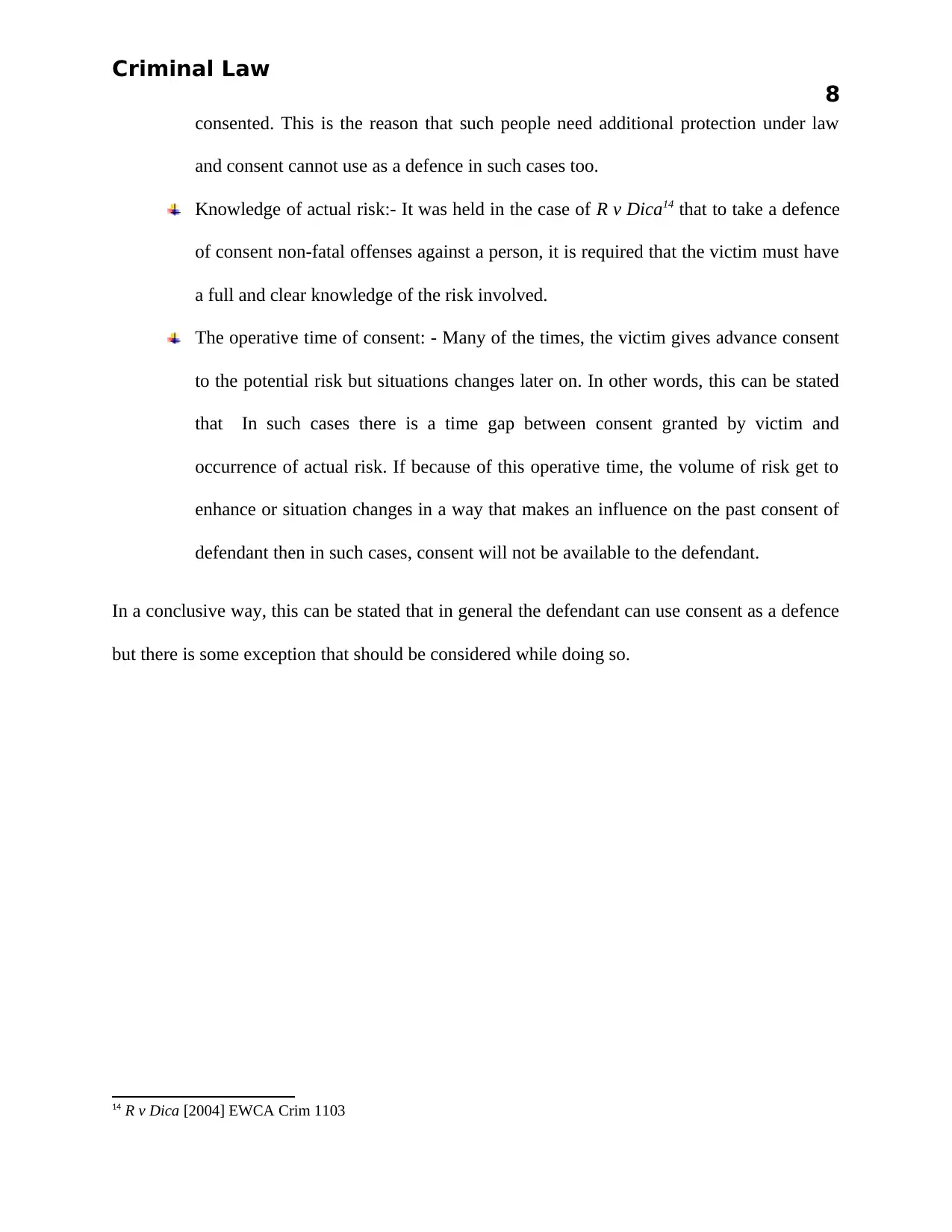
Criminal Law
8
consented. This is the reason that such people need additional protection under law
and consent cannot use as a defence in such cases too.
Knowledge of actual risk:- It was held in the case of R v Dica14 that to take a defence
of consent non-fatal offenses against a person, it is required that the victim must have
a full and clear knowledge of the risk involved.
The operative time of consent: - Many of the times, the victim gives advance consent
to the potential risk but situations changes later on. In other words, this can be stated
that In such cases there is a time gap between consent granted by victim and
occurrence of actual risk. If because of this operative time, the volume of risk get to
enhance or situation changes in a way that makes an influence on the past consent of
defendant then in such cases, consent will not be available to the defendant.
In a conclusive way, this can be stated that in general the defendant can use consent as a defence
but there is some exception that should be considered while doing so.
14 R v Dica [2004] EWCA Crim 1103
8
consented. This is the reason that such people need additional protection under law
and consent cannot use as a defence in such cases too.
Knowledge of actual risk:- It was held in the case of R v Dica14 that to take a defence
of consent non-fatal offenses against a person, it is required that the victim must have
a full and clear knowledge of the risk involved.
The operative time of consent: - Many of the times, the victim gives advance consent
to the potential risk but situations changes later on. In other words, this can be stated
that In such cases there is a time gap between consent granted by victim and
occurrence of actual risk. If because of this operative time, the volume of risk get to
enhance or situation changes in a way that makes an influence on the past consent of
defendant then in such cases, consent will not be available to the defendant.
In a conclusive way, this can be stated that in general the defendant can use consent as a defence
but there is some exception that should be considered while doing so.
14 R v Dica [2004] EWCA Crim 1103
⊘ This is a preview!⊘
Do you want full access?
Subscribe today to unlock all pages.

Trusted by 1+ million students worldwide
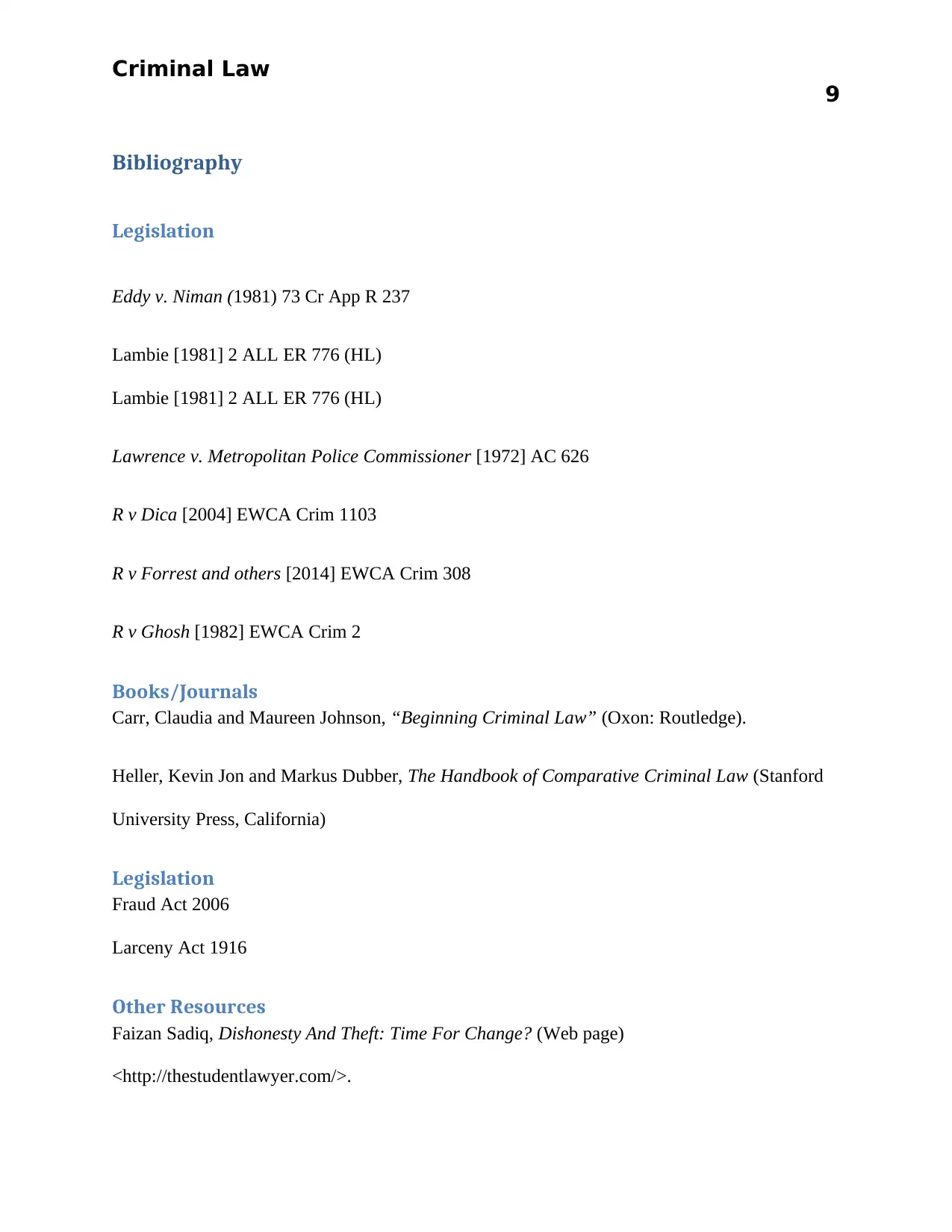
Criminal Law
9
Bibliography
Legislation
Eddy v. Niman (1981) 73 Cr App R 237
Lambie [1981] 2 ALL ER 776 (HL)
Lambie [1981] 2 ALL ER 776 (HL)
Lawrence v. Metropolitan Police Commissioner [1972] AC 626
R v Dica [2004] EWCA Crim 1103
R v Forrest and others [2014] EWCA Crim 308
R v Ghosh [1982] EWCA Crim 2
Books/Journals
Carr, Claudia and Maureen Johnson, “Beginning Criminal Law” (Oxon: Routledge).
Heller, Kevin Jon and Markus Dubber, The Handbook of Comparative Criminal Law (Stanford
University Press, California)
Legislation
Fraud Act 2006
Larceny Act 1916
Other Resources
Faizan Sadiq, Dishonesty And Theft: Time For Change? (Web page)
<http://thestudentlawyer.com/>.
9
Bibliography
Legislation
Eddy v. Niman (1981) 73 Cr App R 237
Lambie [1981] 2 ALL ER 776 (HL)
Lambie [1981] 2 ALL ER 776 (HL)
Lawrence v. Metropolitan Police Commissioner [1972] AC 626
R v Dica [2004] EWCA Crim 1103
R v Forrest and others [2014] EWCA Crim 308
R v Ghosh [1982] EWCA Crim 2
Books/Journals
Carr, Claudia and Maureen Johnson, “Beginning Criminal Law” (Oxon: Routledge).
Heller, Kevin Jon and Markus Dubber, The Handbook of Comparative Criminal Law (Stanford
University Press, California)
Legislation
Fraud Act 2006
Larceny Act 1916
Other Resources
Faizan Sadiq, Dishonesty And Theft: Time For Change? (Web page)
<http://thestudentlawyer.com/>.
Paraphrase This Document
Need a fresh take? Get an instant paraphrase of this document with our AI Paraphraser
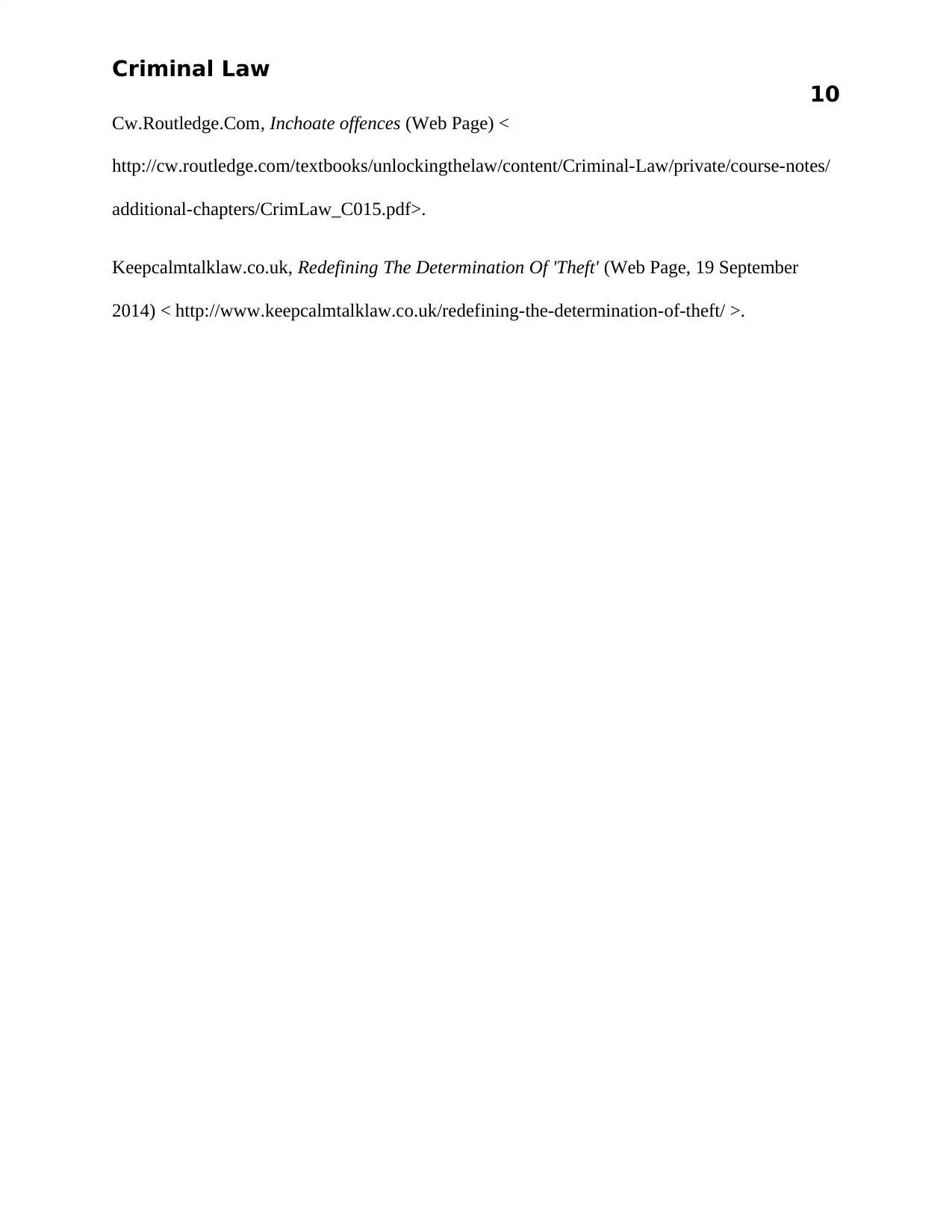
Criminal Law
10
Cw.Routledge.Com, Inchoate offences (Web Page) <
http://cw.routledge.com/textbooks/unlockingthelaw/content/Criminal-Law/private/course-notes/
additional-chapters/CrimLaw_C015.pdf>.
Keepcalmtalklaw.co.uk, Redefining The Determination Of 'Theft' (Web Page, 19 September
2014) < http://www.keepcalmtalklaw.co.uk/redefining-the-determination-of-theft/ >.
10
Cw.Routledge.Com, Inchoate offences (Web Page) <
http://cw.routledge.com/textbooks/unlockingthelaw/content/Criminal-Law/private/course-notes/
additional-chapters/CrimLaw_C015.pdf>.
Keepcalmtalklaw.co.uk, Redefining The Determination Of 'Theft' (Web Page, 19 September
2014) < http://www.keepcalmtalklaw.co.uk/redefining-the-determination-of-theft/ >.
1 out of 11
Related Documents
Your All-in-One AI-Powered Toolkit for Academic Success.
+13062052269
info@desklib.com
Available 24*7 on WhatsApp / Email
![[object Object]](/_next/static/media/star-bottom.7253800d.svg)
Unlock your academic potential
Copyright © 2020–2026 A2Z Services. All Rights Reserved. Developed and managed by ZUCOL.





